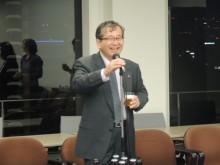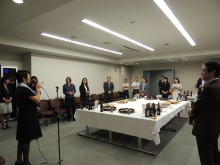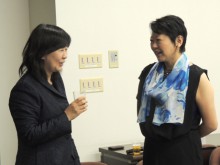2015.10.13
News
HeForShe Symposium
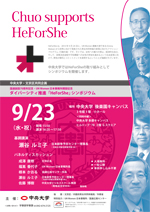
On September 23, 2015 the HeForShe Symposium for Promoting Diversity was held at Chuo University’s Korakuen Campus.
Following a welcoming speech from Kaoru Nemoto, Director of the United Nations Information Centre Tokyo, Rumiko Seya, Chuo alumnus and President of Japan Center for Conflict Prevention gave a lecture on “Diversity for Building Peace: Women’s Roles in the Disputing Areas”.
Speakers actively exchanged views during the panel discussion under the topic “How to develop globally active women: The role of HeForShe”. Members included Seya, Nemoto, Director of Bunkyo Ward Hironobu Narisawa, Director of UN Women Japan Liaison Office Kayoko Fukushima, and Professor of Chuo Graduate School of Strategic Management Hiroki Sato.
The Symposium was open to all audiences including students, faculty and staff, and was broadcasted live at Tama Campus G Square, allowing many people to join the event. Masako Mori, House of Councilors member in the Japanese Diet, among other political members, gave congratulatory messages which were introduced during the Symposium.
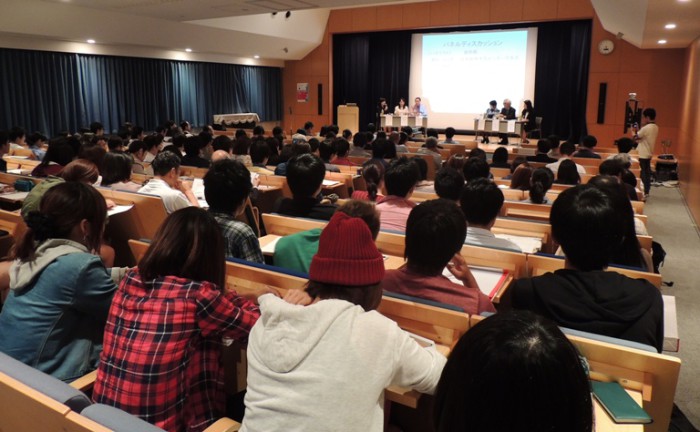
Chuo University's commitment
Chuo University is a member of the United Nations Academic Impact (UNAI) since June 2010. The UNAI is an initiative that links institutions of higher education with the UN. Currently members of the UNAI have reached more than 1000 institutions globally and approximately 40 institutions in Japan. Chuo University is responsible as an information hub by offering a network platform in Japan to support the information dissemination throughout the nation, and manages the website for UNAI Japan.
Chuo supports UN Women’s HeForShe campaign as a part of the UNAI initiatives.
Related links:
United Nations Academic Impact (UNAI), Japan
United Nations Academic Impact (UNAI)
HeForShe
About Chuo supporting HeForShe
Keynote Lecture
“Diversity for Building Peace: Women’s Roles in the Disputing Areas”
by Rumiko Seya, President of Japan Center for Conflict Prevention
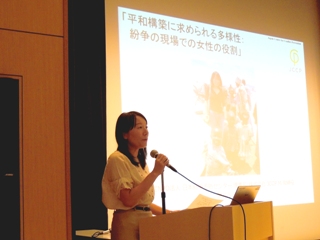
(Excerpt from lecture)
At the root of various conflicts occurring in the world are growing issues of economic and social gaps. The people who cause conflicts often raise the underlying cultural elements such as racial, gender, and religious backgrounds. My job is to rebuild the torn ties of diversification in the affected areas and provide support for sources of peace.
Today as Japan faces its 70th year since the end of World War II, there have been over 500 disputes and wars in the world. The victims, who are mostly women, are facing violence sexually and physically. It is ironic that the meeting we hold to support the local community is only participated by men. We, on the other hand, have learned to listen to and share information with the women who gather at the local wells, which have given us a picture of the problems that are prevalent in their society.
When a local citizen said to me that she was able to talk to me about her troubles because I was a woman, I strongly felt responsible to reach out to these women and help alleviate their problems by solving the issues that were hidden away in their society.
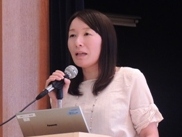
The idea of being a globally active individual, in my mind, is to be able to contribute without boundaries. I believe that people who are making positive changes in society regardless of what they do, where they are from, gender or race, is a potentially global individual. You will be able to work more effectively when you reflect on gender and race with this mindset. If you don’t have a good understanding of thinking beyond boundaries, your actions will most likely backfire and end up in a negative spiral. However, with a firm and open mindset you will be surprised to find yourself contributing globally even if you hadn’t aimed for the outcome.
Panel Discussion
“How to develop globally active women: The role of HeForShe”
Chuo University’s Vice President Chikako Takeishi facilitated the panel discussion that incorporated different perspectives by speakers from Bunkyo Ward, UN functions, NGO, and university institution. Topics that were discussed not only included HeForShe activities but also the challenges society is facing to raise the capabilities of women.
(Excerpt from panel discussion)
Rumiko Seya, President of Japan Center for Conflict Prevention
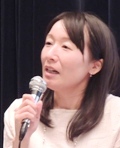
Thinking about how global issues relate to yourself, and how you are connected to the world will broaden your horizons. It is extremely important to value the choices you have in your life today as you focus on your interests. There are many reasons you may come up with that won’t let you take that first step. But let me tell you that you won’t have those same choices next year, or the year after that. If you don’t take action now, you will lose that single opportunity. My advice is to become aware of these choices to be able to prioritize your actions which will lead you to succeed in various areas.
Hironobu Narisawa, Director of Bunkyo Ward
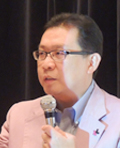
HeForShe does not only imply awareness towards what men can do to support women, rather it is also SheForHe at the same time. This movement is not only for educated women but should be shared across all women and men working together to change society.
The fastest way to developing globally active women is by changing society’s current employment structure. We need to revise the current system so that women can feel comfortable raising children and focus on their career at the same time.
Kayoko Fukushima, Director of UN Women Japan Liaison Office
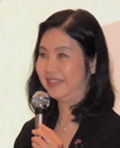
UN Women is the UN organization that focuses on gender equality and women’s empowerment. Our main initiatives are about establishing services, regulations and programs to enable international standards in cooperation with the government and civil society.
There will be no gender equality or women’s empowerment without the understanding and support from men. I am still grateful for my bosses when I used to work at the Ministry of Foreign Affairs, who were supportive when I had to leave the office early to take care of my sick child.
In order to foster a society that develops globally active women, we need to change the current work and educational environment. My message to students is to take on challenges in various areas to become globally active.
Kaoru Nemoto, Director of the United Nations Information Centre Tokyo
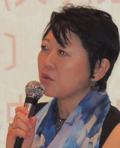
Becoming a global individual is not about going overseas. Notice daily that there are many global seeds around us in Japan. Be curious and ask questions. Challenging problems and raising issues will help you develop the skills needed to be globally active. In my case, it was about minority issues and rights of non-Japanese citizens that led me to my job.
Novel peace prize laureate Malala Yousafzai was not raised in a special family or environment. However, despite the violence that tried to stop her, she did not stop to fight for the rights of women’s education. This tells us that we can also do what Malala did. All we need to do is stand up and take the first step. Emma Watson, UN Women’s spokesperson, mentioned that no nation has achieved gender equality yet. Together we can become the fastest nation to reach this goal.
Hiroki Sato, Professor of Chuo Graduate School of Strategic Management
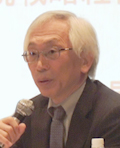
Before you immerse yourself in international institutions, I recommend you to first build experience in domestic companies. The concept of diversity can be understood even when you are in Japan. Everyone is different, even among Japanese. It is trying to understand that everyone is different that will lead you to global opportunities.
There is no limit to possibilities. Take action. Don’t make boundaries. Take initiative and make full use of your potential.
Meeting before the Symposium
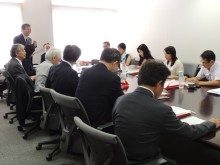
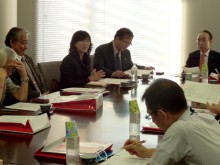
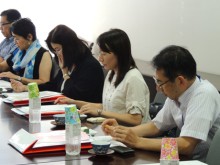
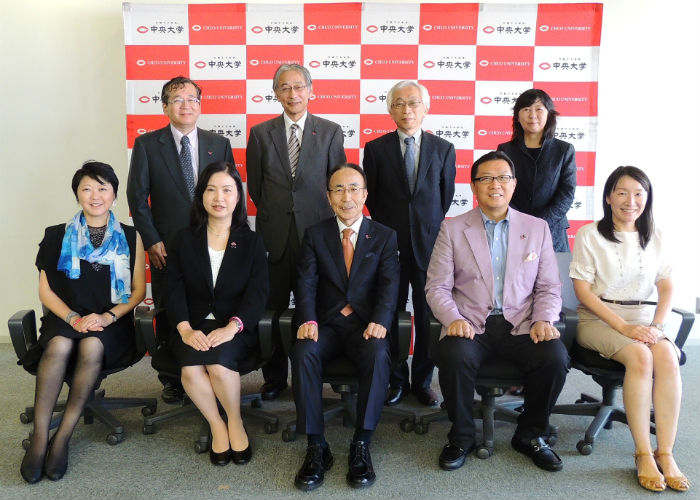
Live broadcast
The Symposium was broadcasted live so students were able to watch from G Square on Tama Campus.
Both venues were shown on the screen at Korakuen Campus.
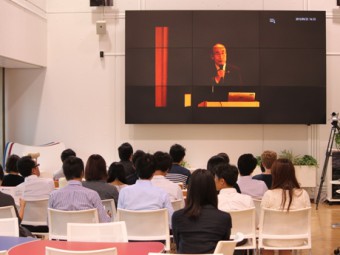
At G Square, Tama Campus
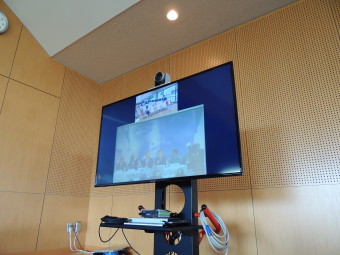
At Korakuen Campus
Reception
A reception was held for the guests and speakers following the Symposium.
